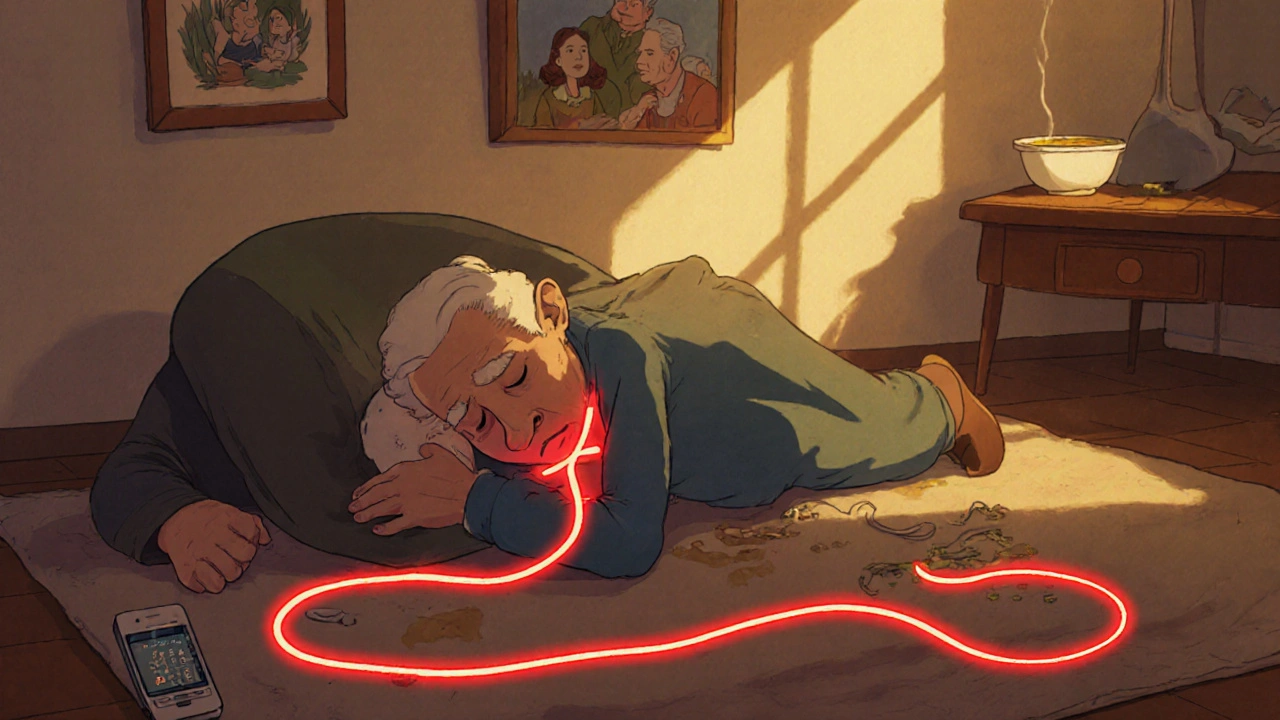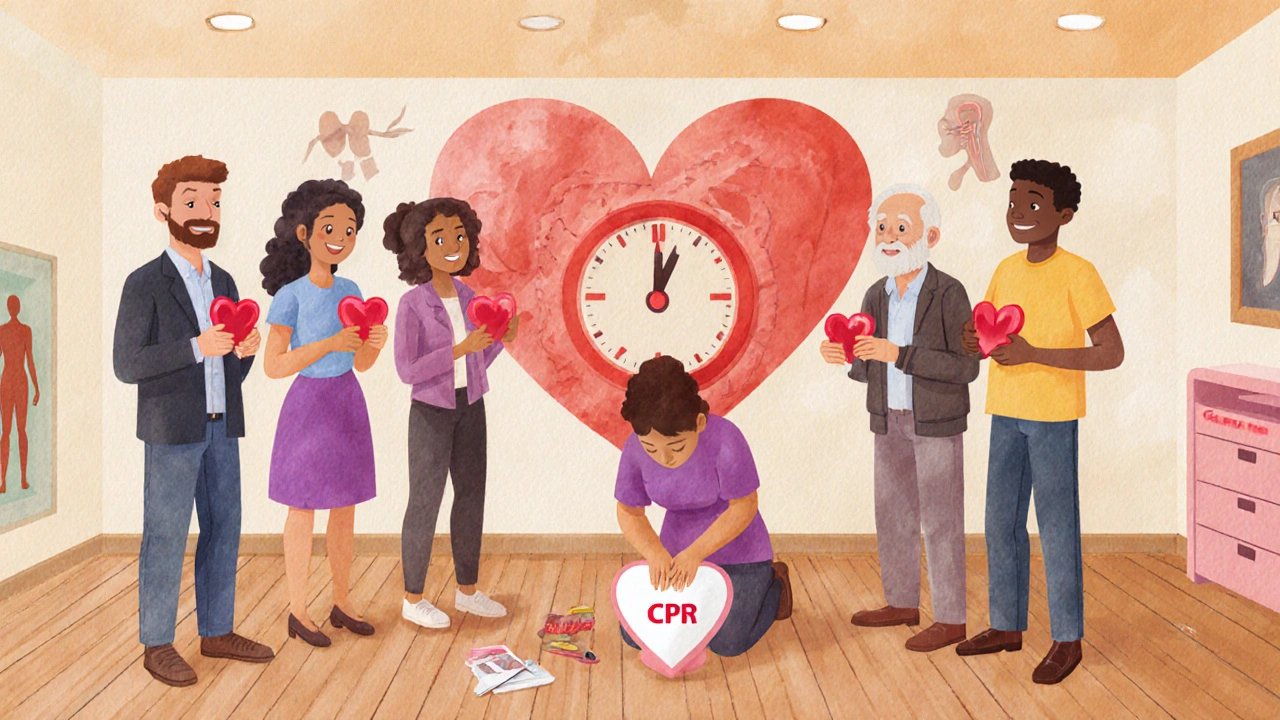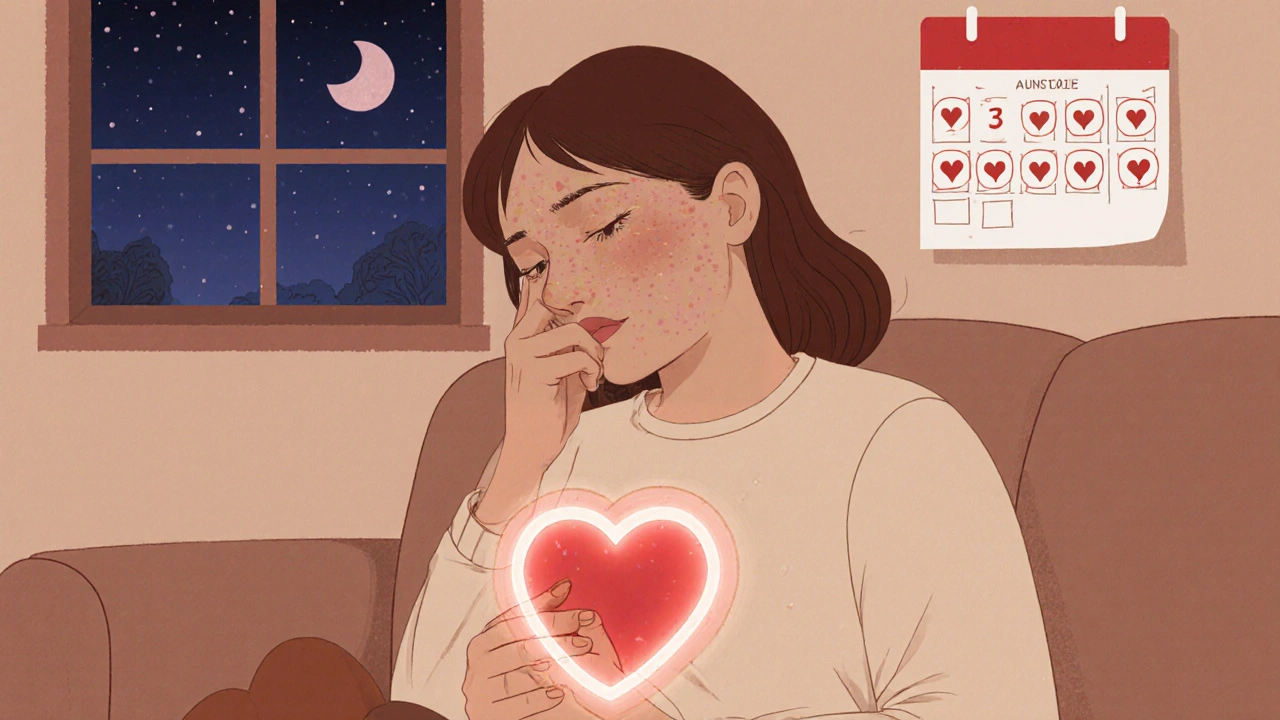Heart attack symptoms don’t always look like what you see in movies. No one clutches their chest and collapses dramatically. More often, the warning signs are quiet, confusing, and easy to ignore-especially for women, older adults, and people with diabetes. But every minute counts. If you or someone you know is experiencing these signs, acting fast can save a life.
What a Heart Attack Actually Feels Like
A heart attack happens when blood flow to part of the heart muscle gets blocked, usually by a clot. Without oxygen, heart cells start dying. Research shows you lose about 1.5 million heart cells every minute the blockage stays untreated. That’s why timing matters more than almost anything else. The classic sign is chest discomfort-pressure, squeezing, fullness, or pain in the center of your chest that lasts more than a few minutes or comes and goes. But that’s not the whole story. About 65% of people feel pain or discomfort elsewhere: in one or both arms, the back, neck, jaw, or stomach. Some mistake it for indigestion, muscle strain, or even anxiety.Symptoms That Are Easy to Miss
Shortness of breath is common, even without chest pain. It can show up alone, especially in women. You might feel winded walking up a flight of stairs or even while sitting still. That’s not just being out of shape-it could be your heart struggling. Cold sweats are another red flag. Not the kind you get from being nervous. This is sudden, drenching, and unexplained. You might feel clammy, pale, or chilled even when the room is warm. Nausea, vomiting, or stomach upset happens in about 25% of cases. People often go to the ER thinking they have the flu or food poisoning. In fact, 24% of heart attacks are initially mistaken for digestive issues. If you’ve had no recent food poisoning, no fever, and suddenly feel sick to your stomach, don’t brush it off. Unusual tiredness is one of the most overlooked signs-especially in women. Nearly half of women report extreme fatigue in the days or weeks before a heart attack. It’s not just being tired from work. It’s a deep, bone-weary exhaustion that doesn’t go away with rest. Lightheadedness or sudden dizziness can also signal trouble. You might feel like you’re about to pass out, even if you haven’t stood up. This happens because the heart isn’t pumping enough blood to your brain.How Symptoms Differ Between Men and Women
Men are more likely to have the textbook chest pain. About 90% do. But only 64% of women report it. That’s why women are more likely to be misdiagnosed. Their symptoms often look like something else. Women are 58% more likely than men to have shortness of breath as their main symptom. They’re 47% more likely to feel nauseous or vomit. And 37% more likely to have pain in the back or jaw without any chest discomfort. Older women-especially those over 55-are twice as likely as men their age to experience “atypical” signs like overwhelming anxiety or a feeling of impending doom. One woman described it as “like a ghost had walked over my grave.” Men might feel pain radiating down the left arm. Women often feel it in both arms, or just the right one. Some don’t feel pain in their arms at all-they just feel weird.Silent Heart Attacks Are Real
About 30% of heart attacks in people over 75 happen with no chest pain at all. These are called silent heart attacks. You might only notice mild fatigue, trouble breathing, or a strange feeling in your stomach. Many people don’t realize they’ve had one until a routine EKG years later shows damage. That’s why regular checkups matter-even if you feel fine. If you’re over 50, have high blood pressure, diabetes, or a family history of heart disease, don’t wait for symptoms to appear.
What to Do If You Suspect a Heart Attack
If you think you or someone else is having a heart attack, don’t wait. Don’t drive yourself. Don’t call a friend to come over. Call 911 immediately. Ambulance crews can start treatment while en route. They can give oxygen, aspirin, and monitor your heart. Studies show they get patients to the hospital 25% faster than private vehicles. That time difference can mean the difference between life and death. If the person is conscious, not allergic to aspirin, and hasn’t been told by a doctor to avoid it, chew one 300mg aspirin. Don’t swallow it whole-chewing it gets it into your bloodstream faster. It helps thin the blood and can reduce damage. Stay calm. Sit down. Don’t exert yourself. If the person loses consciousness and stops breathing, start CPR if you know how. If you don’t, the 911 operator can guide you through it. Hands-only CPR-hard, fast chest compressions-is enough to keep blood flowing until help arrives.Why People Wait Too Long
The average person waits three hours before calling 911. That’s too long. Why? Fear. Embarrassment. Denial. Many people think, “What if it’s not a heart attack? I don’t want to waste the paramedics’ time.” But emergency responders would rather come out 100 times for false alarms than miss one real heart attack. Women are more likely to delay because their symptoms don’t match what they’ve been taught. They think, “I’m not the type.” Or, “It’s probably stress.” A 2023 survey found that 52% of heart attack survivors waited because they weren’t sure it was serious. One woman in Halifax waited two days because she thought her jaw pain was from clenching her teeth. It turned out to be a heart attack. Her story isn’t rare.What You Can Do Now
You don’t need to be a doctor to recognize the signs. Learn them. Talk about them with your family. Make a plan. If you live with someone over 50, especially if they have risk factors like high blood pressure, diabetes, or smoking, talk to them about heart attack symptoms. Write them down. Put them on the fridge. Encourage your parents, siblings, or friends to get a checkup. Don’t wait for symptoms. High cholesterol and high blood pressure often have no signs until it’s too late. If you’re under 40 and active, don’t think you’re safe. Heart attacks in people aged 25 to 44 have been rising by 2% each year since 2000. Lifestyle matters. So does genetics.
Technology Can Help-But It’s Not a Replacement
Wearable devices like Apple Watch or Fitbit can now detect irregular heart rhythms. Some can even spot signs of atrial fibrillation, which increases heart attack risk. But they can’t diagnose a heart attack. A new AI tool called CardioLogics AI can predict heart attacks 30 minutes before symptoms start by analyzing EKG patterns. It’s 92.7% accurate. But it’s still in early use. Most people won’t have access to it. Relying on tech alone is dangerous. Your body gives you signals. Learn to listen.Community Matters
Communities with CPR training programs have 28% higher survival rates for out-of-hospital cardiac arrests. Take a free course. Many libraries, community centers, and hospitals offer them. If you’ve ever watched someone have a heart attack and didn’t know what to do, you’re not alone. But you can change that-for yourself, for your family, for your neighbors.Don’t Wait for the Perfect Moment
There is no perfect time to act. If you’re unsure, call 911. Better to be wrong than to lose someone because you hesitated. Heart attacks don’t announce themselves with sirens. They whisper. And if you don’t listen, they’ll take you.What are the most common heart attack symptoms in women?
Women are more likely than men to experience shortness of breath, nausea or vomiting, back or jaw pain, and extreme fatigue without chest pain. About 64% of women report chest discomfort during a heart attack, compared to 90% of men. Many women describe the feeling as pressure or tightness rather than sharp pain, which leads to delays in seeking help.
Can a heart attack happen without chest pain?
Yes. About 30% of heart attacks in people over 75 occur without any chest pain-these are called silent heart attacks. Symptoms may include sudden fatigue, dizziness, nausea, or unexplained shortness of breath. People with diabetes are also more likely to have silent heart attacks because nerve damage can dull pain signals.
Should I take aspirin during a heart attack?
If you suspect a heart attack and are not allergic to aspirin, chew one 300mg tablet while waiting for emergency help. Aspirin helps thin the blood and can reduce heart damage. But only do this if your doctor hasn’t told you to avoid it. Don’t take aspirin if you’re unsure-it’s better to wait for paramedics than risk stomach bleeding or other complications.
Is it safe to drive myself to the hospital during a heart attack?
No. Driving yourself delays treatment and puts you and others at risk. Ambulance crews can begin life-saving care on the way to the hospital-giving oxygen, monitoring your heart, and preparing the ER team. They also arrive 25% faster than private vehicles. Call 911 immediately.
How long do I have to act after symptoms start?
The window for the best outcome is 90 minutes from symptom onset. After that, heart muscle damage increases rapidly. Every minute without blood flow kills about 1.5 million heart cells. The average person waits three hours before calling 911-delaying treatment increases death risk by up to 50%.
Can stress or anxiety cause heart attack symptoms?
Yes, anxiety can cause chest tightness, shortness of breath, and nausea-symptoms that mimic a heart attack. But that doesn’t mean you should ignore them. If you’re unsure whether it’s anxiety or a heart problem, call 911. Many heart attacks are misdiagnosed as anxiety, especially in women. It’s safer to be checked out than to assume it’s just stress.
Are heart attacks more common in older adults?
Heart attacks are most common in people over 65, but they’re rising in younger adults. From 2000 to 2016, heart attacks in people aged 25-44 increased by 2% each year. Lifestyle factors like poor diet, lack of exercise, smoking, and obesity are driving this trend. No age group is immune.
What should I do if I think someone else is having a heart attack?
Call 911 right away. Stay with the person. If they’re conscious, help them sit down and loosen tight clothing. If they’re not allergic to aspirin, give them one 300mg tablet to chew. If they lose consciousness and stop breathing, start CPR. If you don’t know how, the 911 operator can guide you. Don’t wait for someone else to act-your quick response could save their life.

Jenny Lee
November 19, 2025 AT 11:43Just saw my mom ignore jaw pain for days-thought it was a toothache. Turned out to be a silent heart attack. Don’t wait. Call 911. Period.
Brandon Lowi
November 20, 2025 AT 06:35They say ‘heart attack’ like it’s some Hollywood trope-chest clench, dramatic collapse, cue the violins. Nah. Real life? It’s your grandma whispering ‘I’m just tired’ while her skin turns gray. It’s the quiet betrayal of your own body. And we’re too busy scrolling to notice. America’s dying from denial-and we call it ‘being strong.’
Richard Couron
November 21, 2025 AT 17:43They don’t want you to know this-but the FDA and Big Pharma are suppressing the real cause: 5G radiation from smartwatches triggers micro-clots. That’s why they push aspirin-it’s a distraction. They want you to think it’s ‘lifestyle’ so you keep buying their gadgets and meds. I’ve seen the documents. The truth is buried under EKGs and profit margins.
Alex Boozan
November 22, 2025 AT 05:15Let me be clear: if you’re over 50 and not running a full cardiac panel every six months, you’re playing Russian roulette with your myocardium. The medical-industrial complex doesn’t care about prevention-it cares about stents, angioplasties, and recurring revenue. Your GP won’t tell you this, but your biomarkers are screaming. Get a lipid panel. Get an hs-CRP. Get a coronary calcium score. Or die quietly on your couch while the system profits.
mithun mohanta
November 23, 2025 AT 14:10Oh, how quaint-Americans still think heart attacks are ‘natural.’ In India, we’ve known for centuries that the body is a temple of prana, and when the apana vayu stagnates, the heart weeps. Modern medicine? A crude bandage on a soul-level rupture. I’ve studied Ayurveda and quantum cardiology-this is not just biology, it’s cosmic imbalance. You cannot quantify the soul’s distress with an EKG. But I suppose your pills are cheaper than enlightenment.
Evan Brady
November 24, 2025 AT 06:30One thing nobody mentions: women’s fatigue isn’t just ‘being tired.’ It’s like your bones are filled with wet sand. You can’t shake it. I had a patient-58, no chest pain, just couldn’t get out of bed for three weeks. EKG showed a prior infarct. She thought it was menopause. We almost lost her. If you feel that kind of exhaustion, get checked. No excuses.
Ram tech
November 24, 2025 AT 13:44why do people even care? its just a heart. you got two. if one dies, the other one works. just eat less pizza and stop being lazy. also, why do they make this so complicated? just call 911 if you feel weird. duh.
Erica Lundy
November 24, 2025 AT 15:31There is a profound irony in our collective denial: we have never been more informed, yet less attuned to the subtle language of our own physiology. The heart, in its silent endurance, speaks not in screams but in sighs-fatigue, breathlessness, a chill that lingers without cause. We mistake these whispers for weakness, when they are, in fact, the most urgent eloquence of survival. To ignore them is not negligence; it is a metaphysical refusal to acknowledge mortality itself.
Kevin Jones
November 26, 2025 AT 03:06They want you to think it’s ‘chest pain’-that’s the script. But the real script? Your body’s screaming in Morse code: dot-dot-dot-dash-dash-dash-dot-dot-dot. And you’re too busy checking your email to decode it. You think you’re busy. You’re just dying slowly. And the system? It’s billing you for the privilege.
Premanka Goswami
November 27, 2025 AT 03:10Big Pharma knows the truth: heart attacks are engineered by the government to keep people dependent on meds. They add fluoride to the water to weaken arteries. Watch the CDC’s funding reports-they’re funded by Pfizer. That’s why they push aspirin. It’s not healing-it’s control. You think your EKG is real? It’s a placebo with wires. The real test? Your gut. And yours is screaming.
Alexis Paredes Gallego
November 28, 2025 AT 00:53Oh, so now we’re supposed to believe the system? The same system that told us cigarettes were healthy? That told us trans fats were fine? That told us vaccines cause autism? Now they want us to believe ‘call 911’ is the answer? No. The real emergency is the entire medical paradigm. They don’t want you to live-they want you to be a patient. I’ve seen the footage. They stage these ‘heart attacks’ in hospitals to justify the billion-dollar cath labs. Don’t be fooled.
Saket Sharma
November 29, 2025 AT 16:06You think this is about health? This is about control. The elite don’t want you healthy-they want you compliant. That’s why they push ‘aspirin’ and ‘911’-it’s a trap. You go to the hospital, they implant a stent, you become a lifelong customer. Meanwhile, the real solution? Fasting. Cold exposure. Sunlight. But you won’t hear that from your ‘doctor’ because he’s on a Pfizer retainer. Wake up. Your heart doesn’t need a pill-it needs freedom.